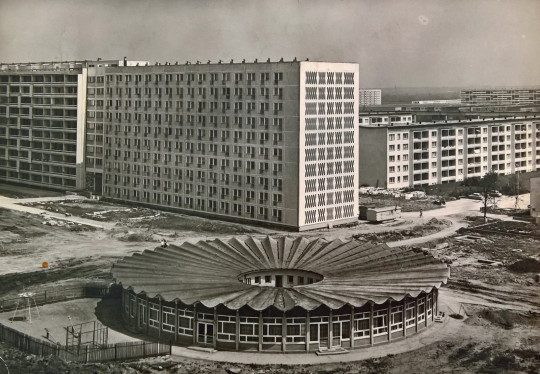#German postwar modernism
Text

St. Christophorus
Preungesheim/Frankfurt
30 notes
·
View notes
Photo

St. Thomas in Hörnum, Sylt.
Build (1969-1970) by Martin Bernhard Christiansen.
#Architecture#St. Thomas#Hörnum#Sylt#Martin Bernhard Christiansen#German Postwar Architecture#German Postwar Modernism
0 notes
Text

a kindergarten stands in the foreground
0 notes
Note
yo you post your fics on AO3? if so please share your user babe
omg yes I do! you can check my swiftywrites tag but
Masters of the Air:
Kingdom for a Kiss - WIP (34k written, 19k Posted) Long-form Postwar exploration of Clegan's relationship and their trauma. Updates weeky. Mature rating will be bumped to Explicit later
“I wasn’t the one all but begging to be shot by the guards for months on end there Bucky.” Buck shakes his head, laughing sharply. His anger was a living thing now and he aches with it “Nah, nah, not me. No, I was the one dragging your crazy ass back from the brink time and time again. Trying to convince those fucking Germans your sorry carcass was of more use alive than dead, trying to keep the men busy and motivated while you fucked about. You're welcome by the way.” He jabs a finger in John's direction, who stares at him taken aback. “So’s I don’t see much of a reason why I should let you come up into my home and cast your judgments around.”
Bucks chest heaves, great gulps of air like he’s once again racing through snow-covered German trees. He can tell he’s shocked John into silence, the other man's eyes darting back and forth. Buck averts his gaze, brushing his hair back from his face. That’s twice now he’s lost himself at the people he cares about. Twice now he’s bitten a hand reached out in kindness.
Gale takes a deep breath to compose himself, tucks the jagged angry edges of himself back to face inwards. “You said you would write.”
Little Beast: Ongoing. Porn with a bit of Plot modern au of Burnout John and Priest Gale. 9k of them fucking and arguing. p2 is in the drafts and will be part of a series of stories. NSFW to the max
“It’s such a shame you’re cooped up in here like Rapunzel there Buck.” John drawls lazily. He makes a show of looking around “Is Mother Gothel nearby?”
Buck has to fight back against another smile, wouldn't give him the satisfaction or the encouragement “Father Huglin is away at a conference today.”
“All alone without a chaperone.”
press your tired hands against my lips darling: Finished. 3K word re-write of the Bucks final conversation in the cockpit. Loose prequel to KfaK but with some minor inaccuracies Mostly SFW
Gale takes John's hand, brings the scarred knuckles to his mouth and holds it there, turns their hands over til he can place his lips to the pulse point at John’s wrist. It’s not a kiss, there’s no press or pursing of lips, but tender nevertheless, intimate in a way that makes Gale shudder. Cautious of whether John will even allow this.
“I ain’t prayed in a long time,” Gale says whisper-soft. He feels John’s pulse skip a beat, “but I prayed every day you were safe and alive and coming back to me. Every morning, and every night.” He lets himself cry again, tears hidden against the scarred skin of John's hand.
The Old Guard:
in another life maybe you and i would be walking down an aisle in white: Finished Joe/Nicky (18K) Art Professor Joe & Art Conservator Nicky reconnect after ten years. This one is uh. Sad. Mind the tags. It's an incredibly personal piece to me and probably one of my favorites .NSFW
Dear Joe, you have always been the brave one and I wished every moment for even a drop of that. Perhaps that is why I claimed you as mine, out of a desperate need to have even an ounce of what made you, you. I desired you but I would not, could not ever let you in. I loved you and kept you and hurt you, keelhauled you against the impenetrable ship that was my heart and when the ragged pieces were left behind I still asked of you your silence.
It is no wonder our love was left in bloody tatters on that lawn.
Make me a Saint: Finished (8k) Nicky and Nile mete out some justice to a corrupt priest. NSFW for violence. Mind the tags. As of right now, my most popular fic
“ I was a priest before your bible was even written old man ” Nickys voice thunders in the tiny room, crackling over the walls like fire. Even Nile flinches at the sudden volume. He takes another step forwards, bracketing Father Marcus’ arthritic twisted feet with his own.
His voice does not shake.
“I preached the word of God before your language was even invented . I have known the church for longer than you can comprehend. I have seen great men and evil men take up the word of the Lord and I have seen them all rendered dust. I have seen you and I have judged you, Father Marcus. The Church may practice restraint but I do not. The diocese may have turned a blind eye I but I do not. The courts may have found you innocent but I do not .
Calcification of a God: Finished (4K) Nicky has a lil Menty B and then Joe gives him a bath. Mostly SFW if I recall correctly
“I think,” Nicky says “If I were God, it was you I modeled humanity after. I think if I were God I would have left my throne in heaven to walk beside you and I would have been richer for it”
Yusuf chuckles “Death makes you sentimental my darling.”
Wolfstar:
Oh Captain, My Captain!: Finished, 1.6k Drabble of Wolfstar cuddling and reciting poetry. SFW
He cups the back of Remus’s head, presses him further into the safety of his body with a hand on his mismatched, misaligned rib cage and rocks them slightly. Remus grunts slightly. Sirius hides the teeth of his smile against the follow of his own neck and allows the curtain of his hair to cover them both for a moment. He listens to the two of them breath, always slightly out of sync, out of rhythm. Remus quick and labored, Sirius racing to catch up only to find himself charging ahead only to drop back behind when he tries to slow down.
“ If I vibrate with vibrations other than yours, must you conclude that my flesh is insensitive ” That doesn’t fit quite right, so he tries another, brow furrowed and fingers tracing the knobs of Remus’ spine like the knots on a tree, with reverence and a little hint of greed.
#swiftytalks#swiftywrites#my fics#wolfstar#clegan#joe x nicky#the old guard#masters of the air#just thought i would take this chance to compile all the links
30 notes
·
View notes
Text
"The racist dimensions of international politics were manifest and explicitly challenged during the many months of intensive meetings at the Versailles Peace Conference of 1919 – at which was established the scaffolding of postwar colonial and imperial arrangements, including the British Mandate over Palestine.
White powers often described the struggle for 'world domination' as a 'race war' in the late nineteenth and early twentieth centuries. British imperialists distinguished between white and nonwhite (or 'coloured') peoples and assumed the former should rule and the latter should be ruled, defining 'Syrians' and Afghans, for example, as
'nonwhites.' ... Irrespective of anti-Semitism and the historically situated and to some degree malleable nature of whiteness as a social construct, Zionist settler-colonialism was understood by its advocates and their British and US allies to be a white socioeconomic project. Racism in Mandate Palestine expressed itself through civilizational discourse, extraction from the native population, the biopolitics of colonial categorizations and counting, and the systematic maldistribution of life, death, and wellbeing by investment priorities. Such maldistribution by priority is underplayed as a systemically racist dimension of settler-colonialism and colonialism in Palestine.
... The 'blueprint' for the Allied postwar geopolitical order, the League of Nations and its Mandate system, was authored by racist
war hero Jan Smuts, an Afrikaner from South Africa, at the behest of the British government. Published in December 1918 as The League of Nations: A Practical Suggestion, the document became a worldwide bestseller. Its stated purpose was to establish 'a means to prevent future wars.' Smuts’s use of the terms 'self-determination' and 'no annexation,' drawing on Woodrow Wilson’s Fourteen Points released in January 1918, offered thin ideological cover for European and US imperialist aims to control postwar geopolitics and resources. The 'peoples left behind' by the dissolution of the Russian, Austrian, Ottoman, and German empires, Smuts rationalized, were 'largely incapable or deficient in the power of self-government.' ... Smuts argued ... that the peoples of Palestine and Armenia were too 'heterogeneous' to be consulted regarding any future arrangement.
... By the 1919 Versailles Peace Conference certainly, British colonial politicians recognized, to borrow Helen Tilley's words, that egregiously racist policies threatened the stability of the colonial order by making 'governing far more difficult.' At the same time, policies of social equality or parity threatened to 'undermine' the (extractive and violent) logic of colonial relationships – the colonizer must be above the colonized. When such hierarchy was shaken, the 'prospects of [the colonized person’s] future usefulness [to the colonial state] is destroyed.' This helps explain why criticism of racial prejudice by some colonial elites 'was insufficient to undermine the social hierarchies of colonial states.'"
Frances S. Hasso, Buried in the Red Dirt: Race, Reproduction, and Death in Modern Palestine (2021)
21 notes
·
View notes
Text


In 1935 Helmut Hentrich and Hans Heuser by founding an architectural office lay the foundation for what is still one of Germany’s largest architecture firms: Hentrich, Petschnigg & Partner (HPP) based in Düsseldorf, Germany. The firm’s current name dates back to 1953, the year Hans Heuser suddenly died and Hubert Petschnigg joined the office as partner. This change in the firm’s structure coincided with the accelerating German „Wirtschaftswunder“ which brought about a boom in (re)construction from which also HPP profited: buildings for banks, corporations, government institutions as well as churches and apartment buildings made up a great deal of the firm’s commissions and soon catapulted it to the forefront of the industry.
In 1985, on the occasion of HPP’s 50th anniversary, the firm self published the present retrospective volume which contains a cross section of the firm’s projects: the Aluminium- and Drahthaus in Düsseldorf, early 1950s examples of transparent office building architecture, the Dreischeibenhaus for the steel company Thyssen also in Düsseldorf but also first international steps in South Africa. Since the book doesn’t include plans and sections the target audience probably was long-term customers and associates: excellent photographs capture key projects and demonstrate the firm’s capabilities. At the same time they show that HPP kept pace with the changing currents in architecture as e.g. the Rank Xerox administration in Düsseldorf represents their take on brutalism. Accordingly the volume first and foremost is a nicely illustrated picture book that shows several highlights of German postwar modern in beautiful black-and-white photographs.
12 notes
·
View notes
Text








Ono Tadashige is a leading representative of Japanese postwar printmaking. His art style was strongly influenced by the movement of social-critical prints that was wide-spread in the 1920s and 1930s in Germany, Russia, China and also in Japan as the 'proletarian and farmers art movement'.
Ono Tadashige was born on January 19, 1909, in Tokyo, Japan. He had studied art at the Hongo Art Institute from 1924 until 1927. In 1941 Ono Tadashige graduated from the department of Japanese and Chinese languages of Hosei University Higher Normal School. At a young age he became an active member of the sosaku hanga and the proletarian art movement.
After the end of the Pacific War the artist's International career began. His prints were accepted for several of the International Print Biennials - 1957 in Tokyo and 1961 in Moscow. Ono Tadashige became a visiting professor at a couple of Japanese universities - Tokyo University of Fine Arts, Aichi University of Fine Arts, Hiroshima University, and Utsunomiya University.
The artist published several books on modern Japanese hanga and one book on Chinese prints.
Ono died October 17, 1990.
Prints - Style and Technique
The early prints made by the artist, meaning before world war II, were deeply rooted in the social-critical movement of German expressionism and the art trend dominating in Russia and among critical, intellectual circles in China (Luxun).
At the same time, there was a similar art movement in Japan, led and nurtured by Kanae Yamamoto (1882-1946), who is considered the founding father of the sosaku hanga movement. When Kanae Yamamoto tried to return from Europe to Japan in 1916, while world war I was raging, he stopped in Moscow for several weeks, and experienced the beginning of the Russian revolution. Back in Japan, Kanae Yamamoto pursued utopian socialist ideas by founding such projects like "Japan Children's Free Painting Society" or the "Farmers' Art Movement".
This was the background which had formed the character and art style of Ono Tadashige. After the end of the Pacific War, Ono Tadashige's enthusiasm for the ideas of proletarian revolution had lessened, but the way he saw his environment had not changed much.
His favorite subjects were town views of the industrialized areas - factories with tall chimneys, canals with tug-boats. The artist does not show a beautified Japan, but the Japan of industrialized cities.
Ono Tadashige's technique and style is congruent with his subjects. The colors used, are somber with much use of dark brown and black. And while a printmaker usually starts to print the light colors and then adds or overprints the dark colors, Ono Tadashige did it the other way round.
He began the printing process by darkening the paper with black ink. The light and white colors added on top of the black background gave them a kind of opaque effect, which is so typical for the art prints of Ono Tadashige.

18 notes
·
View notes
Text
cant decide if Ludwig would have like a cozy lidl grandma home bc he’s so attached to the old things and he thinks it’s cozy ^_^ or if he would rock da Postwar Modern German interior design ……. Much 2 think about … …. Actually. Like this: Ludwig has a cozy little house on the countryside where he resides and then a modern apartment in Berlin with shit like this




8 notes
·
View notes
Text
In the history of jurisprudence generally, and in German law in particular, the royal intervention in the Millers Arnold case is infamous for being a violation of judicial independence and thus an act of executive overreach that threatens the foundation of rule of law; that it corrected a manifest injustice is not seen as bearing significantly on the problems of the case, and you may draw what parallels you like with yesterday's exploration of suo motu actions by courts in South Asia, especially as they converge with public interest litigation in India.
Rule of law is a crucial element of not only a just society in general, but the Great Compromise of liberalism in particular. It's important to the former, because it's a component of a predictable rules-based system that ensures equal protection under and equality before the law, and to the latter because a predictable and institutions-based system where avenues of reform are known and consensus-building methods available allows for social systems where people don't have to worry that, unless they seize power through violence and maintain it by repression, they might suffer intolerably or actually be killed. This is a massively important component of why we don't, for instance, have to have a succession war every time the executive changes, and in just about every case of violent upheaval in previously peaceful societies I would argue that you can show that either the Great Compromise failed or was never operative.
But rule of law on its own is not justice. This is something that in modern times German jurists have had to struggle with quite notably, because authoritarian systems of government in the 20th and 21st have often been very particular about preserving the forms of rule of law, while getting the outcomes they wanted. This is true of all manner of personalist and populist regimes, and can be seen in Hungary, Poland, and Russia today, but it's also true of ideological regimes who, even if they may contest specific principles that are seen as integral to rule of law in other countries, like free speech, an independent judiciary or free elections, are still at pains to frame their overall institutions as legitimate, democratic, and principled.
In the postwar era, this principle had to be grappled with in Germany as pro-democracy politicians and jurists had to struggle to articulate what exactly had failed in 1933, how the German state afterward could be treated as illegitimate, even though the formal institutions of the Weimar constitution had remained intact, and how they could build a just and democratic system going forward, which necessarily required repudiating a period of bloody lawlessness, no matter how much it had tried to cloak itself in the law. This is especially important for academic jurisprudence, which as I understand is more important in a civil law system, because legal principles are less often derived directly from judicial decisions (which are far weaker in their precedent-setting capacity) and more often derived from academic writing about the law (which influences and is influenced by the actions of the judiciary and the legislature).
Thus, modern German jurisprudence distinguishes rule of law from rule by law. Rule by law may conform to the appearance of rule of law, but it does not owe allegiance to more fundamental principles of justice: the law is an expedient to get the outcome you want, and not reflective of a set of deeper principles you're trying to uphold through the rules and institutions you put in place. Rule of law requires that allegiance, and real rule of law might require opposing institutions or rules--even when procedurally correct--if they violate fundamental principles of justice. You might pass a law somewhere tomorrow, through all the correct methods of constitutional amendment and parliamentary procedure, declaring all left-handed people must pay the government $500 as a one-time tax on their stubborn and immoral behavior of writing with the wrong hand. Under real rule of law, such a law is invalid no matter how popular, how procedurally correct, or how evenly it is implemented, because it's an inherently unjust act of oppression. No amount of legalistic procedure can rescue it, because it adheres to no principle other than "fuck left-handed people."
This distinction is really important, because it goes to something about courts that the reams of commentary on Millers Arnold missed, which is that no court can be legitimate unless it actually renders good decisions. Yes, by ordering his courts to rule differently, Frederick II undermined the independence of the Prussian judiciary, and this may have weakened confidence in Prussian courts in the aftermath. It's hard to have a rules-based system of government if the king often arbitrarily reverses decisions of his courts. But the real problem is deeper: it was a bad decision. If courts cannot be expected to render good decisions, a crisis of legitimacy will follow, because manifestly unjust courts are an equal or bigger problem for rule of law than judicial independence. In the modern world, where we rely on things like the Great Compromise to prevent violent revolution (Prussia did not have that; there's a reason the Prussian monarchy no longer exists), courts that make bad decisions violate a fundamental tenet of the Compromise.
An intervention like Frederick's, or like the suo motu actions of Indian courts, doesn't really protect rule of law at the expense of rule by law; the best it can do is correct a unique injustice in a non-systematic way, and in that case it might be an individually positive outcome, albeit one that comes at a notable institutional cost. Ideally, it could help improve faith in systems of justice (or in the Compromise itself), while reform is pursued through other avenues, to prevent long-term harm and to reduce the need for such interventions in the first place. In practice it doesn’t seem to do that, unfortunately, meaning the downside is even greater, though correcting the individual injustice is still very good. If you do not have the opportunity for these one-off interventions by a higher authority to correct injustices, you improve the resilience of your institutions, which is usually a good thing. But you also lose an important valve for letting off pressure if those institutions are dysfunctional.
With the preliminaries out of the way, let's talk about the US Supreme Court.
The US Supreme Court is going to overturn Roe v Wade, a decision which even many supporters of the political outcome think is decided on shaky theoretical grounds. Because of the way law is created and interpreted in common law systems, the theoretical grounds of a decision like Roe are more important than they would be in a civil law system, though my understanding is that the picture is more complicated than just a decision creating law: in principle two different decisions might reach the same conclusion based on different rationales, and it would be up to future judges in future cases to negotiate exactly which rationale they should use when interpreting the law going forward. Overturning a decision outright is rare, especially when you have the option of saying "okay, Case A rendered the right decision for the wrong reasons; in this case, we're going to alter the reasoning a little bit to make interpretation of the law more consistent going forward."
Maintaining Roe in some form is supported by an absolutely silly proportion of the US population, AFAICT; something like 65%, in an era when 65% of Americans can't agree that the sky is in fact blue. Support for specific restrictions on abortion is much more varied, because this is a subject that politically the country is fairly ambivalent on, but the Supreme Court has many tools in its toolkit besides "let one court case from 1973 stand or fall on its own," and outright reversal of that decision is likely to be broadly seen as a bad move. This, on its own, is not necessarily a problem: courts often have the job of making merely unpopular decisions in the name of justice. That doesn't mean they're failing to abide by higher principles. Sometimes--as in Loving v Virginia--it just means popular opinion is unprincipled.
I'm not actually concerned with Roe directly here, but I do think that Roe bears on the idea of a crisis of legitimacy in the Supreme Court, which the Court is rightly worried about. Unfortunately, the Court does not understand what the source of this crisis is: it is the fact that the Court has become concerned almost solely with rule by law, rather than rule of law. Much more indicative of this trend than Roe is Shinn v Ramirez, in which the court ruled that a mere probability of innocence isn't enough to void a conviction, even in a capital case; more fundamental procedural violations must have occurred to prevent the penalty from being carried out (in this case, execution).
This is a huge problem. Isolated from external concerns--that is to say, in an abstract and theoretical void, which is where SCOTUS seems to dwell--procedure is indeed of great importance. Procedure is a component of an equal application of the law, a way to instrumentalize more fundamental principles in a way transparent to those who are subject to a court's authority. But those fundamental principles still matter; indeed, they matter more than procedure, because rule of law is not the same as rule by law.
The fundamental principle at stake in a criminal trial is the guilt of the accused. If procedure cannot accommodate overturning a verdict which is incompatible with this principle, the procedure is unsalvagable. It is a violation of the very purpose of law; we may as well revert to mob violence, which at least doesn't require paying bailiffs or maintaining expensive neoclassical buildings on valuable downtown real estate. If the Supreme Court cannot see the underlying principle beyond the screen of procedure, then the Supreme Court is setting its own legitimacy on fire. Overturning Roe is relevant here only insofar as it's a manifestation of a broader trend of the Supreme Court setting its own legitimacy on fire, then complaining about the smell of smoke.
Moreover, this is not a new phenomenon. Shinn v Ramirez is part of a long line of tough-on-crime court decisions and legislative acts (especially in capital cases) that sacrifice fundamental principles in favor of smoothing procedure for state actors; on the basis of "reforming the death penalty" the right to habeas corpus was severely curtailed in 1996, with the fundamental principle of protecting the rights of the accused being sacrificed to the much more contingent procedural question of how easy it should be for the state to kill someone. Note also the raft of cases as the drugs commonly used in executions have become less available in the US; SCOTUS has repeatedly opted to weaken principles against cruel and unusual punishment rather simply require the state not to torture prisoners to death or not kill them if it can't do it in a way compatible with the constitution, which is a startling reversal of principle is supposed to govern the law. Most peoples' moral intuition, I suspect, is that while the law may permit the state to do a thing, if it cannot do the thing in a just manner, it should not do it; SCOTUS seems to think, however, that if the law permits the state to do a thing, then by definition it is possible to do in a just manner, regardless of the facts on the ground.
It is increasingly difficult to escape the conclusion that, especially as it pertains to criminal law and the death penalty in the US, the single most significant opponent to the rule of law is the Supreme Court. An institution as defensive and insular as the Supreme Court will not reform itself, nor do I expect external pressure to cause it to reform. If the rule of law is to be maintained in the United States--if the fundamental principles on which the law is built and which it is necessary to preserve to prevent that rule from being replaced by empty ritual that can reach arbitrary conclusions--then the Supreme Court must be destroyed. I do not believe it can be reformed. I do not believe any of its current justices are redeemable, since they are the product of a selection process which has consistently produced lawless outcomes. It must be replaced by an institution which hears cases more consistently, and therefore which has many more justices; this would also prevent the highly variable outcomes that result from selection effects and reduce the political fracas around individual appointments. Its members, and all federal judges, should be nominated through non-political means. And if nominees for the federal judiciary cannot agree that, as a matter of first principle, the state should not execute those who are actually innocent of the crime they are accused of, and should strive to its utmost ability to avoid that outcome, they should be entirely disqualified.
252 notes
·
View notes
Text

Wolfgang Schäuble, who has died aged 81, was a giant of German public life, epitomising the successes, anxieties and obduracy of his postwar country. The longest-serving parliamentarian in German history, Schäuble played a pivotal role in two crucial events of the past four decades – the process that led to reunification in 1990 and the austerity measures imposed across much of Europe following the global financial crash of 2008.
To the German public, he will probably be best known as the politician who was shot while campaigning, by a man suffering from mental illness, and paralysed from the waist down, only to return to frontline politics within months. Seven years later, in 1997, Schäuble was asked by an interviewer from Stern magazine how his use of a wheelchair might affect his chances of fulfilling his ultimate ambition. “A cripple as chancellor?” he replied. “You have every right to ask that question.” Bluntness and a lack of self-pity became his leitmotifs.
The second of three sons of Karl, a tax adviser, and Gertrud, Schäuble was born in Freiburg im Breisgau, in the southwest region of Baden Württemberg, and studied law in his hometown and in Hamburg, though he quickly turned to politics. He entered parliament for the Christian Democratic Union (CDU) in 1972, at the age of 30. He went on to win the Offenburg constituency 14 times in a row, sitting in the Bundestag under every postwar chancellor except the first, Konrad Adenauer.
In 1984 he entered the cabinet when Helmut Kohl appointed him head of the chancellery (chief of staff) and minister for special affairs. In April 1989, he was promoted to interior minister. It was from that position, but still in the manner of the chancellor’s fixer, that Schäuble led the reunification negotiations that followed the fall of the Berlin Wall.
During these talks he first came across Angela Merkel, an unassuming scientist from the GDR who had become a senior adviser to its outgoing government. The triangular relationship is one of the most fascinating and complex in modern German history. Schäuble claimed to have “discovered” her, suggesting her for the new all-German cabinet. Kohl patronised her as “the girl”, yet he increasingly promoted her. The assumption throughout was, however, that when the time came the one male titan would replace the other.
Kohl’s 16 years of office – a period of economic growth for Germany and the hegemony of post-cold-war liberal economics – ended in 1998 with the election victory of the Social Democrats under Gerhard Schröder. Schäuble, who had been leader of the parliamentary party, effortlessly succeeded Kohl as head of the CDU and leader of the opposition.
Within months, they were embroiled in scandal: a former party treasurer was caught taking a suitcase filled with a million German marks (about £300,000) from an arms dealer in a parking lot in Switzerland. It soon emerged that this transaction formed part of a much vaster system of corruption. Schäuble professed ignorance about the affair, only to be implicated, and exposed as having lied to parliament.
It was then that Merkel struck, publishing a letter in the Frankfurter Allgemeine newspaper in December 1999 in which she called on her party to shift generations. In so doing, she paved the way for her assumption of the crown and her long political hegemony. Kohl never forgave her.
In the fourth of six books he wrote during his career, called Mitten im Leben (In the Midst of Life) and published in 2000, Schäuble talked about his political regrets. He did not criticise Merkel, but, unlike all the other politicians he named with first and surnames, he referred to her as “Frau Merkel”. When he later asked her why she had not informed him in advance of her plans – he was still party leader after all – she replied: “You wouldn’t have allowed me to.”
When she eventually became chancellor in 2005, Merkel appointed Schäuble her interior minister. They buried their differences, and he served her loyally, in that post and then from 2009 as finance minister during her second and third administrations. He became the continent’s dominant economic force and leading enforcer of austerity, seeking to embed Germany’s strictures of balanced budgets – the Black Zero – across the EU. With his opposition to bailouts, and advocacy of spending cuts and structural reforms, Schäuble became an object of hate among many on the left, particularly in those countries teetering on the brink.
In his 2017 memoir, Adults in the Room, Greece’s finance minister at the time, Yanis Varoufakis, claimed that his German counterpart admitted that the medicine couldn’t work, but had to be administered for ideological reasons. Schäuble long denied this. Indeed, one of the curiosities of Germany’s obsession with austerity budgets – which is now causing considerable heartache for Olaf Scholz’s government – is that they remain largely popular, according to opinion polls.
Throughout his career Schäuble was a staunch pro-Atlanticist. He was one of few senior German politicians to support the Iraq war. He was also much more hawkish than others towards Russia, likening its seizure of Crimea in 2014 to Hitler’s annexation of the Sudetenland.
In 2017 he was chosen as president (speaker) of parliament, a role he was initially reluctant to take, but fulfilled with his characteristic acuity. He had let it be known that he would like to become Germany’s president, a largely ceremonial but important position, but was twice overlooked.
Schäuble is survived by his wife, the economist and teacher Ingeborg Hensle, whom he married in 1969, and by three daughters, Christine, Juliane and Anna, and a son, Hans-Jörg.
🔔 Wolfgang Schäuble, politician, born 18 September 1942; died 26 December 2023
Daily inspiration. Discover more photos at Just for Books…?
8 notes
·
View notes
Text

Did you know that the German nature painter Maria Sibylla Merian (1647–1717), who was an insect fanatic, laid the foundations of modern zoology with fantastic illustrations of more than 200 insect species?
Have you heard of the English paper collagist Mary Delany (1700–1788), postwar Japanese photographer Ishiuchi Miyako (b. 1947), and Venezuelan Minimalist Gego (Gertrud Goldschmidt, 1912–1994)?
After reading Katy Hessel’s The Story of Art Without Men, several educators may aspire to redesign their art history surveys and syllabi — and perhaps trade some Picassos or Pollocks for Merians and Gegos.
43 notes
·
View notes
Photo

Alma Mater.
#Christianeum#Arne Jacobsen#Otto Weitling#Hamburg#HH#Architecture#Modernism#Brutalism#German Postwar Architecture#German Postwar Modernism
0 notes
Photo

Ian Ellison: What is it about Rainer Maria Rilke? The influence of the Bohemian Austrian poet on modern culture reads like a who’s who of the great and the good. W. H. Auden, Cecil Day-Lewis, and Edith Sitwell claimed to be directly inspired by him. The first English translations of his work, published by Leonard and Virginia Woolf’s Hogarth Press, became classics in their own right.
He has been set to music (both classical and rock) and proven himself a Hollywood touchstone, most recently providing the concluding epigraph of Taika Waititi’s Jojo Rabbit. Oprah Winfrey has quoted him on television and Lady Gaga has lines from his Letters to a Young Poet (1929) tattooed on her arm.
Maybe he has had such an impact because he is first and foremost a poet of the heart. He expresses those emotions we seldom desire—melancholy, longing, and loneliness above all—with such artistry and feeling that it can seem almost joyful. At the more esoteric end of things, he is regularly co-opted by New Age self-help gurus who take the closing line of his “Archaic Torso of Apollo”—“You must change your life”—as their mantra. Faced with the immensity of his work and its afterlives, you might feel like you know enough about Rilke, but the man himself has for a long time remained something of an enigma. Yet this may well be about to change.
It is rare for a poet to make headlines almost a hundred years after their death, especially for good reasons. But in early December 2022, Rilke was suddenly front-page news across Germany. In what was widely described as the purchase of the century by the German media, the Deutsches Literaturarchiv (DLA) announced it had acquired a collection of Rilke’s manuscripts comprising some 10,000 handwritten pages. These included draft poems and notes for their composition, as well as 2,500 letters written by the poet himself and a further 6,300 addressed to him. One of the most significant literary estates in postwar history, its cultural value is priceless, and it will soon be made available to the general public. A major exhibition at the Literaturmuseum der Moderne (the DLA’s next-door neighbor in Marbach) is planned for 2025 to mark the 150th anniversary of Rilke’s birth, and plans are afoot to digitize the entire collection. After being cataloged, the collection will be made available online without restriction, opening up this treasure trove to academic researchers across the globe, as well as general readers.
[Unboxing Rilke’s Nachlass :: April 6, 2023 • By Ian Ellison]
38 notes
·
View notes
Text
EMMA WARREN
So, how did the band start?
STEPHEN MALLINDER
We started literally taking that Eno ethic, we just used to buy tape recorders. We used to make tape loops, we got shitloads of tape recorders. We used to lug them into this attic, which was the pain in the arse, because some of the tape recorders we used to get back then... It’s interesting electronic music, at that moment in time.
EMMA WARREN
So, we’re talking 1978?
STEPHEN MALLINDER
No, 1974 then. This is about ’73, ’74, when we first started. And if you wanted a tape recorder, you used to go to these trade magazines, called Exchange & Mart in England, and basically they were old government machines. Ex-World War II, military stuff and you buy them for like about £5 and they weighed about two tons. They were fucking massive things, you know?
EMMA WARREN
What did these things look like?
STEPHEN MALLINDER
They were like big lumps of metal, you know? They were like enormous kind of industrial tape machines. We used to get all things like that because that’s where electronic music really came from. People now look at it in terms of Robert Moog and Léon Theremin, etc, but a lot of electronic music and stuff we were doing, actually, it came really from Second World War technology. It came from the whole notion that war obviously does do crap things, but they do certain things and accelerate certain aspects of technology. So, we were picking the things that really were probably used in a war. We got these, you know, really 20- or 30-year-old machines, lugged them up to the attic and made tape loops and things like that.
EMMA WARREN
That’s an interesting idea, isn’t it? War as a motor of modern music.
STEPHEN MALLINDER
Yeah, completely. Well, it is, you know what I mean?
EMMA WARREN
Plus, war invented the Internet.
STEPHEN MALLINDER
Yeah, I mean, that’s right. Kraftwerk resulted from a German culture from the postwar period. So, you got to remember electronic music is quite affected culturally by those things and we were as well, you know?
- Stephen Mallinder interviewed by Emma Warren for Red Bull Music Academy
20 notes
·
View notes
Text
In March 1945, the New York Times called Europe a “dark continent” in a condition that “no American can hope to understand.” Destroyed by political extremism and laid waste by a catastrophic war, Europe had become a problem for “every human being in Capetown, in Kansas City, in Brisbane, in Lhasa.”
Quickened by the emergence of the Soviet Union as a global rival, the United States’ reordering of a prostrate, rubble-strewn Western Europe in the late 1940s produced an unprecedented economic, political, and societal success. Leveraging its economic strength to shape structural change, Washington facilitated the rebirth of the Western European economy, which quickly recovered from wartime destruction. With the Marshall Plan and other programs, the U.S. government conditioned its support on cooperation among European countries, which kick-started the process of economic and political integration, as the late Tony Judt described so well in his magisterial Postwar.
With U.S. nudging, Germany’s erstwhile enemies also accepted West German rearmament and integration into NATO, which kept the Soviets in check and Western Europe secure. All of this produced a period of peace and prosperity that was unprecedented in modern European history, and it laid the foundation for the continent’s peaceful unification after the collapse of the Soviet bloc.
Alas, Europe has lived off the diminishing returns of this epic achievement. Despite the European Union’s vast wealth and potential power, it remains reliably incapable of projecting unitary political action. As Ukraine burns, the Middle East festers, and China looms, European countries seem to be returning to their age-old state of division, competition, and distrust. Governments are divided on everything from Russia to Gaza to the U.S. Inflation Reduction Act. The traditional Franco-German engine of European integration and policy is divided; a dearth of strategic leadership is fragmenting Europe from within. The inability of Paris and Berlin to “speak with one voice” on supporting Kyiv’s war effort, for example, has resulted in protracted disagreements on how to handle the continent’s most serious aggression since World War II.
What the ongoing wars in Ukraine and the Middle East—and Europe’s growing panic over the possibility of no longer having the United States at its side—really highlight is that a window of opportunity now exists for Washington, as in 1945, to bend Europe toward a more strategically responsible direction.
The outcome could be a broadly Atlanticist EU that defends itself by combining NATO resources with far greater European military capabilities. It would be an EU that once again views energy and resource security as a core strategic objective and makes economic relations with like-minded allies a central pillar in its own geopolitical ambitions.
Without more pressure from Washington, the EU will very likely remain a diffident, divided, and awkward partner in confronting Russia, China, and other threats, putting both itself and the United States in danger.
Today, three overlapping events provide Washington with the opportunity to reshape Europe. The first is the ongoing war in Ukraine. Without continued U.S. military support, Ukraine not only lacks the capabilities to regain its occupied territories, but could also fail to defend itself from future Russian offensives. And while the EU loves to trumpet its overall financial aid to Ukraine, Washington has so far provided more military aid to Kyiv than all other major donors combined.
The reality is that the EU remains politically unwilling and militarily unable to compensate for current pause in U.S. military aid. In fact, the decades since 1989 have witnessed a dramatic reduction in European military spending, capabilities, and equipment stocks, and most countries have only recently and reluctantly begun the process of rearming. Even with vastly increased expenditures, it will take decades for the EU to meet its defense requirements.
Brussels was barely able to reach agreement in February on a 50 billion euro ($54 billion), multiyear aid package for Ukraine and will likely bicker for years on end over Ukraine’s prospective EU membership. Even the bloc’s modest aim of supplying Ukraine with 1 million rounds of ammunition by this spring quickly turned out to be unachievable. In the medium term, the EU’s approach to defense is what it has always been: Sunday sermons about European ambitions underpinned by a lazy dependence on the United States.
Despite their soaring rhetoric, Brussels and Kyiv understand that without Washington, Russian President Vladimir Putin holds the long-term advantage not only in Ukraine, but also all along the EU’s exposed eastern flank. No matter who wins the U.S. presidential elections in November, the United States should use the threat of withdrawing from NATO—something that former U.S. President Donald Trump considered during his administration—to fundamentally reshape European attitudes to their own security and defense.
Washington should explicitly link the continuation of U.S. military supplies for Ukraine to increased spending by European NATO members, significant EU funding for the recently launched European Defence Industrial Strategy, and expedited Ukrainian membership in the EU. Given Ukraine’s critical shortages of military equipment, one need not wait until all the details are hammered out, but an initial agreement should be finalized immediately.
This kind of pressure campaign on Europe could also help overcome the refusal of U.S. lawmakers to provide further aid to Ukraine. Once again, Congress could learn from U.S. policy in the 1940s and EU policy today.
The EU’s ongoing 50 billion euro funding package for Ukraine actually includes more than 33 billion euros ($35 billion) in low-interest loans, rather than grants. This is a similar concept to the lend-lease plan, the program used by the United States during World War II to supply Britain and other allies. The 1941 Lend-Lease Act allowed Washington to send war supplies to any nation deemed “vital to the defense of the United States.” Congress could adopt a similar approach to future aid to Ukraine. In fact, a Ukraine Democracy Defense Lend-Lease Act was already passed by Congress and signed by President Joe Biden in May 2022, but it expired at the end of September 2023. Its renewal could give Kyiv the military resources—when combined with European financial aid—to regain its territorial sovereignty.
Such an approach applies both a carrot and a stick to reshape the European Union’s security posture and support Ukraine’s survival. While aid to Ukraine critically serves U.S. national security, it is also a pressure point to shape the EU—which would be most affected if Ukraine were overrun—into a stronger, more useful ally.
The second window of opportunity for the United States to pressure Europe is energy policy. The EU’s ongoing decoupling from Russian natural gas supplies has resulted in a broader debate about how to balance the EU’s strict energy transition objectives—which are costing the bloc and its member states several trillion euros—with security of supply. In a welcome onset of energy realism, the EU recently labeled gas and nuclear energy as “climate friendly” transition fuels in moving toward a zero emission economy.
The United States already supplied nearly half of the EU’s imports of liquefied natural gas in 2022, making it the bloc’s energy supplier of last resort. Washington should condition this openly on Brussels remaining committed to achieving real energy security. Europe’s dependency on Russian gas is one reason that Putin thought he had a free hand to invade Ukraine in 2014 and again in 2022. Washington should press Europe—especially Germany—not to make that mistake again.
Finally, the Kremlin’s war and suspension of gas deliveries to Europe have conspired to unleash political and economic instability in Germany, the EU’s largest and most important economy. Against the background of political chaos—including the monthslong inability to pass a federal budget—an anxious and inward-looking German government is pursuing inconsistent and painstakingly cautious policies on Ukraine aid and other issues, all of which has served to alienate many EU member states. Europe cannot rely on Germany to lead the necessary reorientation of the EU into a bloc capable of developing meaningful military capabilities.
Therein lies the third opportunity and leverage point for the United States. Washington should step into the leadership void—not to lead Europe, but to help hammer out the next phase of the trans-Atlantic security relationship. Many EU member states—including most Nordic, Baltic, Central, and Eastern European states—would welcome direct pressure from Washington to condition trans-Atlantic security relations on clear European policy changes, most notably on a much more serious expansion of defense capabilities and meaningful energy independence from Russia.
That’s why Washington should squeeze Europe like it’s 1945—and why it would benefit both sides.
2 notes
·
View notes
Text
Hanne Darboven
Conceptual artist Hanne Darboven was born in 1941 in Munich, Germany. Darboven is regarded as one of the most important figures in postwar German art, as well as a significant figure in the history of conceptual art. Her art focused on spatializing and visualizing time, inscribing numerical calculations derived from calendar dates. Darboven's art was exhibited in her native Germany and throughout the world, including at the Museum of Modern Art, the Guggenheim Museum, the National Gallery of Victoria, Melbourne, and the National Museum of Art in Osaka.
Hanne Darboven died in 2009 at the age of 67.
6 notes
·
View notes